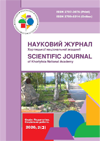UDC 376.3:159.922.763 EMPIRICAL STUDY OF SELF-ASSESSMENT IN SOCIALLY DEPRIVED ADOLESCENTS WITH DISABILITIES IN THE CONDITIONS OF A BOARDING SCHOOL
DOI: https://doi.org/10.51706/2707-3076-2020-3-16
Abstract
The article presents the results of an empirical study of self-esteem in socially deprived adolescents
with disabilities in a boarding school. The purposes and features of the conducted research are revealed. The
experimental base of the study and the number of respondents who took part in it were determined. A set of
diagnostic techniques for primary and secondary diagnostics has been selected.
The levels of self-assessment, according to which the analysis of the obtained data was carried out,
are characterized, namely: overestimated, adequate and underestimated self-assessment.
Inflated self-esteem of adolescents was determined by the following indicators: incomprehensibility of
actions to obtain the desired result, meeting their own needs; manifestations of irritability, rudeness,
stubbornness when dissatisfied with anything, imbalance due to trifles; compensation for dissatisfaction with
their own claims through the commission of various violations.
Adequate self-esteem of adolescents was characterized by the following indicators: attempts to adhere
to socially recognized norms and rules of conduct in any situation; balanced attitude to tasks; willingness to
show initiative, express their own opinions, suggestions; bold, calm disclosure of their achievements, calm
response to comments, shortcomings and attempts to correct them; search in various information media for
answers to questions that interest them; active involvement in the tasks entrusted to them; ability to analyze
and evaluate the results of their activities.
Underestimated self-esteem of adolescents was determined by the following indicators: feelings of
embarrassment among strangers; incommunicability in situations of communication with peers; slow reaction
to any situation; lack of activity and initiative; refusal of any activity due to laziness or fear of possible failure;
insecurity, which leads to refusal to work from the beginning.
The analysis of the obtained average indicators of the levels of self-esteem formation in socially
deprived adolescents with limited life in a boarding school before and after the experimental work in the
experimental and control groups.


